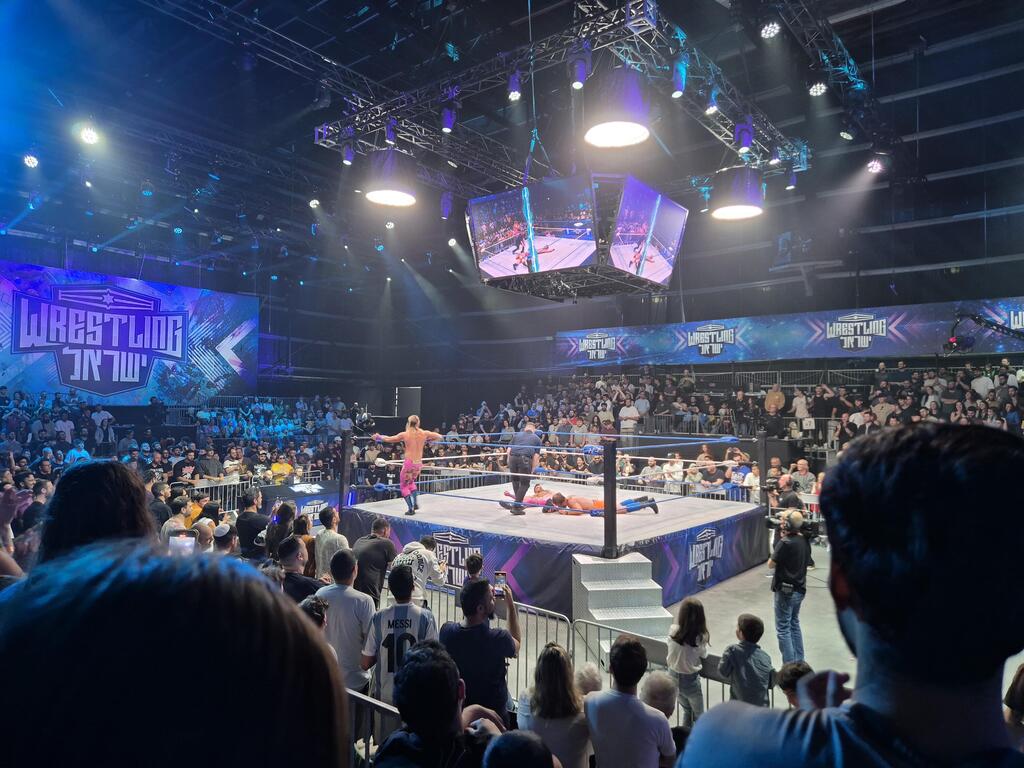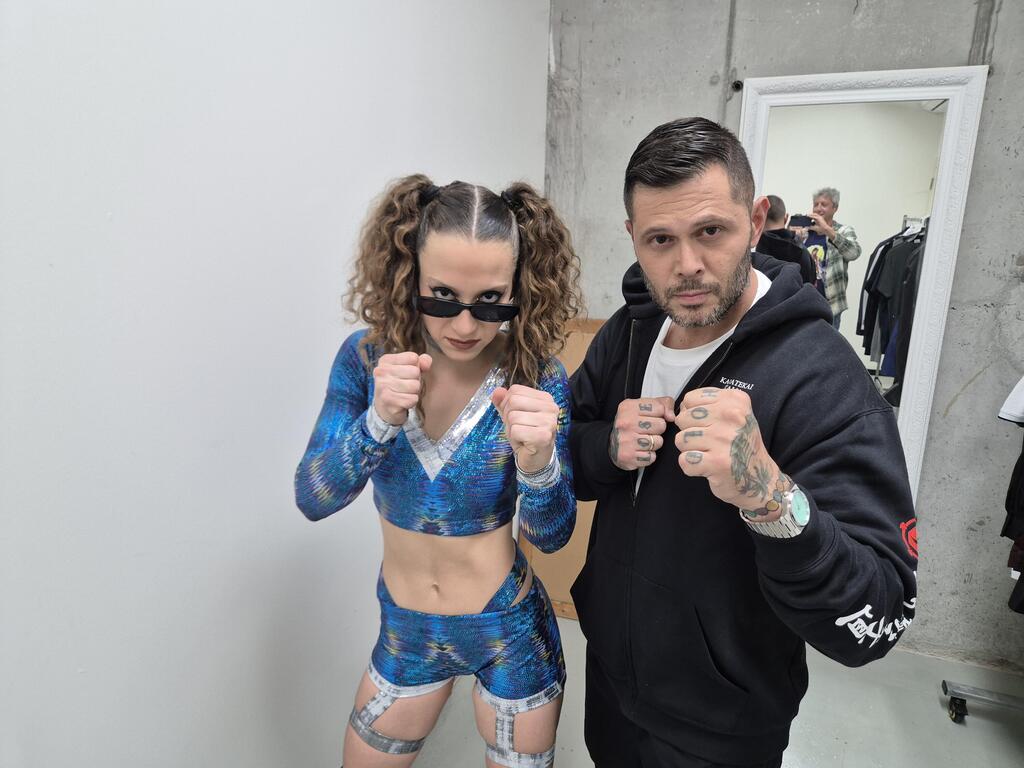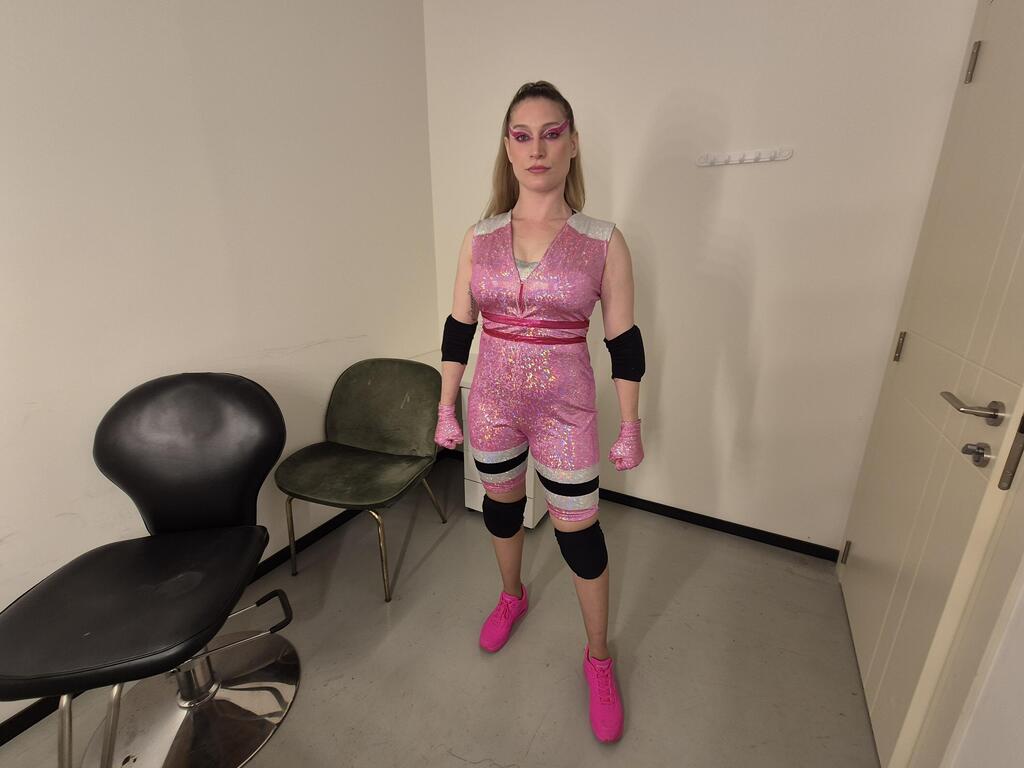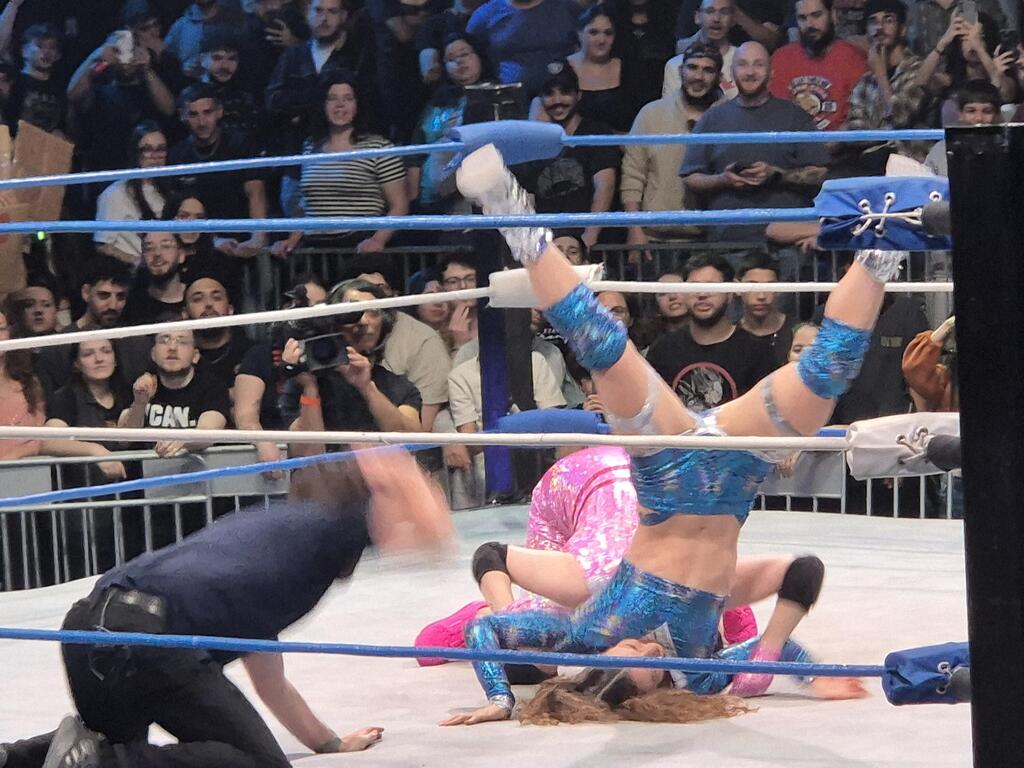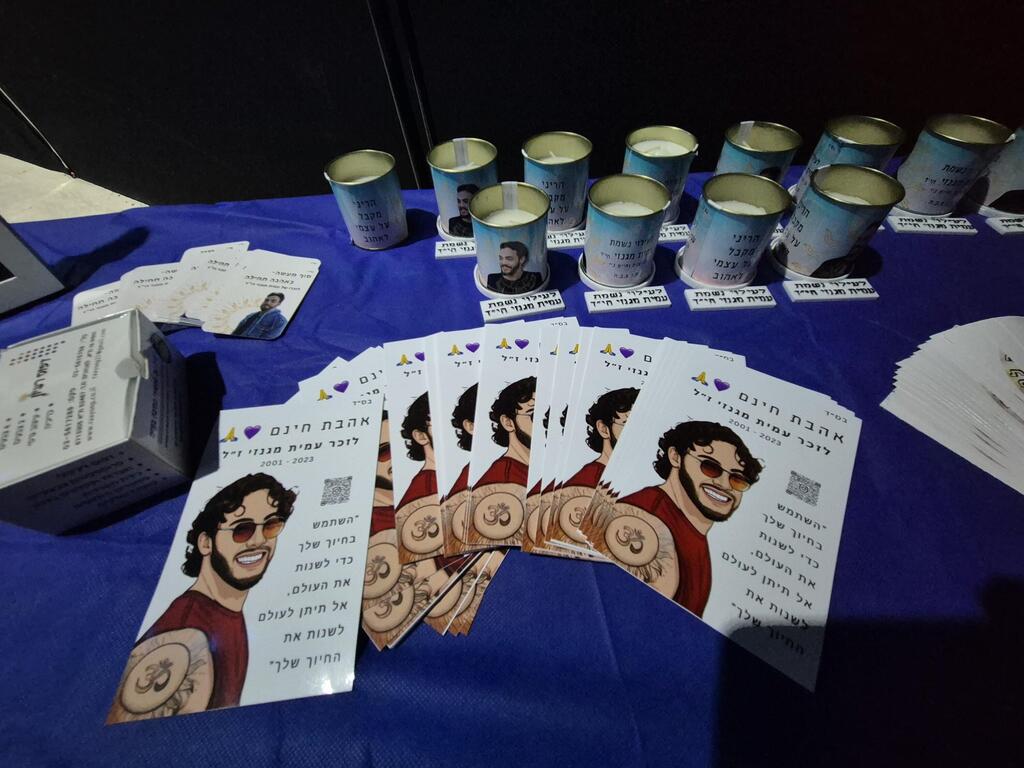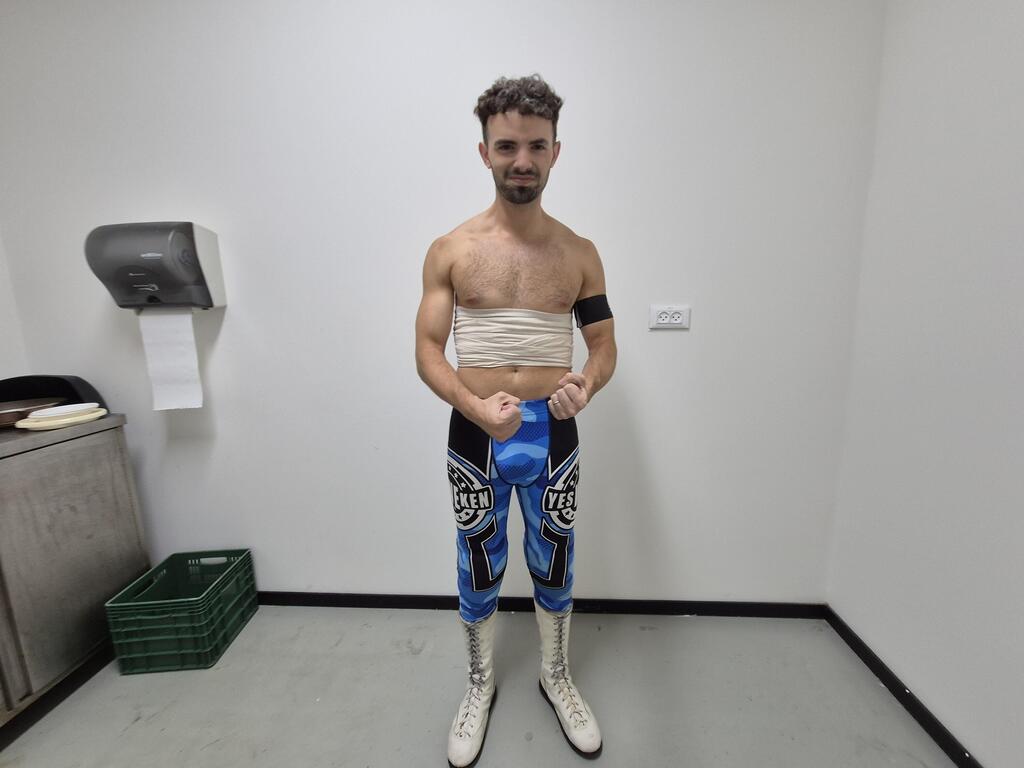Lights on at Mizmor Studios in Rosh HaAyin, the music pulses and a young, energized crowd rises to its feet, roaring in anticipation for a wrestling spectacle unlike any seen recently in Israel.
Leading this electrifying event is comedian Yonatan Barak, who has realized a childhood dream by launching Wrestling Israel, a local professional wrestling league. Barak aims to demonstrate that flying metal chairs, high-impact slams and thunderous slaps from hairless giants can harmoniously coexist with Zionism.
Welcome to Wrestling Israel
(Video: Assaf Kamar, editing: Omri Alkalay Nir)
"Tonight is going to be special," Barak declares backstage moments before the show begins. "Everything is happening here, and it's going to be wild. This is the craziest event we've had so far, and people will be talking about it for a long time. Anyone not here tonight is going to regret it."
The championship belt contested by the wrestlers is no ordinary prize. "It's a legendary belt, made of genuine leather, coated in 24-karat gold and adorned with Swarovski crystals," Barak enthuses. "It's the most stunning thing in the world. If you've seen it, you know it's worth it. Everything here is real; there are no fakes. I have the best fighters you've ever seen in your life, and we're proud to present local wrestling to the Israeli audience. It's no less amazing than any show you've seen abroad. All our wrestlers are superstars, and I'm proud to lead this incredible venture."
Surprisingly, the Prince of the Jews—Barak's ring persona—doesn't remain behind the scenes as the producer and organizer of the electrifying evening. He steps into the ring to settle a personal score with The White Tiger.
"There are more important things than money. This whole endeavor was born out of Zionism—is there anything more Zionist than watching Jewish gladiators fight each other?"
"He messed with my best friend Philip, and today he's going to see blood," Barak proclaims. "I've been training my whole life to fight the White Tiger. He's mine. I promise you an unforgettable match; you're going to see a different side of me tonight, and I assure you this will be one of the best performances I've ever had."
What motivates a successful stand-up comedian, who fills venues with just his words, to enter the world of wrestling and take hits.
"Spend ten minutes inside the arena, listen to the crowd—and you'll understand," Barak laughs but quickly turns serious and adds, "Go down to the studio's dining hall and see how many people this thing feeds. There are more important things than money. This whole endeavor was born out of Zionism—is there anything more Zionist than watching Jewish gladiators fight each other? Come to Wrestling Israel; it'll blow your mind. We're creating a new legacy here, high-level sports entertainment, and it's going to stay with us for many years. It's not just a business; it's our true passion, and I'm proud to stand behind it and lead this great thing.”
Shortly after the interview, Barak, as Prince of the Jews, delivers a thrilling performance featuring tight jeans, a torn shirt and a respectable beer belly. The towering comedian fulfills a childhood dream, entering the ring with his head held high, soaring through the air, taking hits from all directions and exacting revenge.
7 View gallery
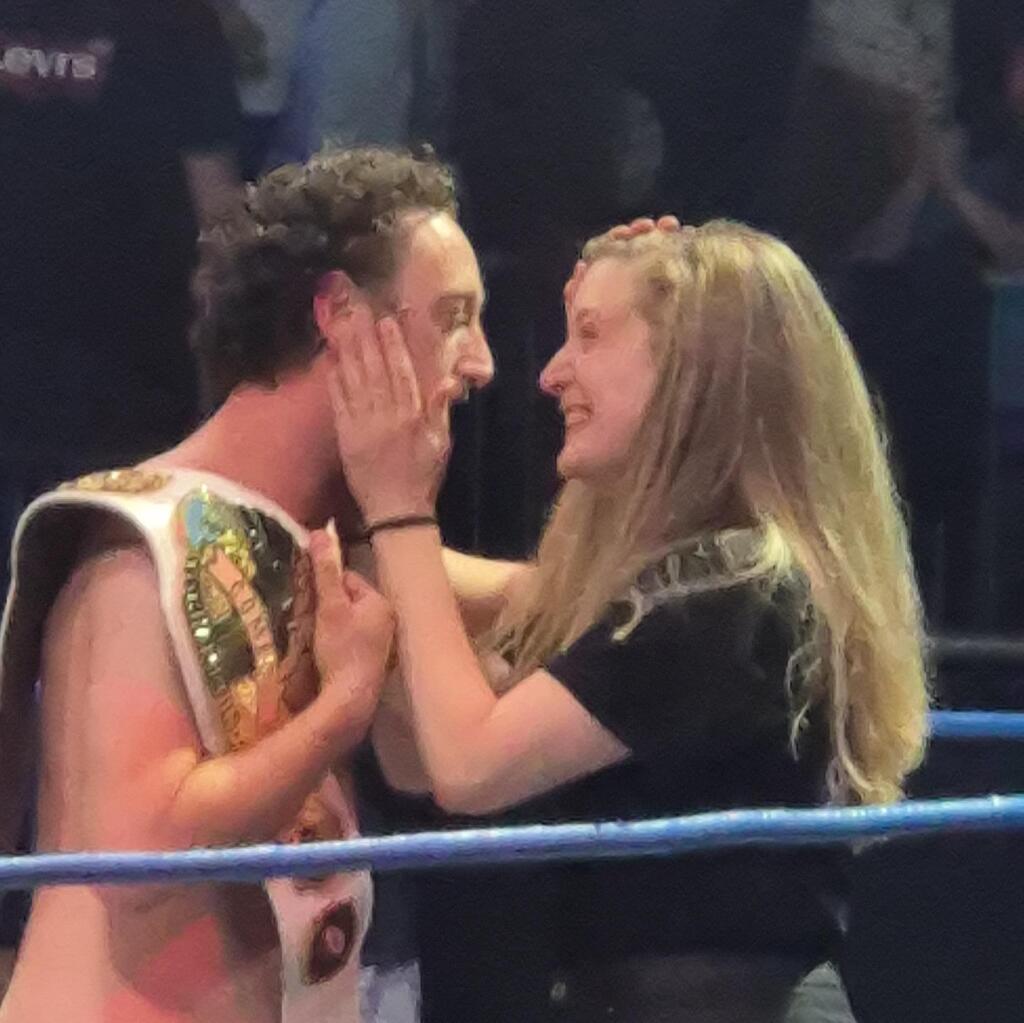

Yonatan Barak and Noa Manor—the power couple of Wrestling Israel
(Photo: Assaf Kamar)
One of the evening's most anticipated matches features the young Shira Sinai in her debut, facing off against Noa Manor, Barak's wife and an accomplished actress and comedian. Sinai promises a particularly brutal fight, supported by her charismatic coach, Shai Hai, a notorious karate artist known for his strict approach from Big Brother.
"I'm pushing her to reach peak aggression," Hai asserts. "There's no calm in these fights. We're coming in sharp, focused, aiming to finish in one go without games. Noa Manor is going to feel all the rage and power Shira has to offer; it's going to be an especially brutal match."
Sinai, the feminist, reinforces his words, confidently declaring, "I'm going to slaughter Noa Manor in the ring. She asked for it, and she's going to get everything she asked for. I'll show everyone why I'm the next star of Wrestling Israel."
On the other side, "privileged" Noa Manor, who Sinai claims "hasn't worked a day in her life and is here because of nepotism," enters the ring with high confidence. By her side stands none other than Avishag Semberg, the Olympic taekwondo medalist who has trained her for this important match. "Semberg taught me tricks, balance and composure. Every bully meets their end, and Shira will face everything she's dished out in recent weeks," Manor states. "She attacked me, threatened me, bullied me. Semberg prepared me physically and mentally, and I'm completely ready for this match."
The show, participants explain, is not violence for its own sake but quality entertainment for the whole family. “Violence is about intending to cause harm,” says Shai Hai. “This is a show and it’s art. The wrestlers are athletes in a way that would impress anyone. It’s controlled therapy—people come here, kids, families—everyone has a great time.”
Back in the arena, the wrestling finally begins. Muscular men in colorful tights and shaved, bare chests trade blows using daring aerial techniques, just like in the American original. The young crowd is fired up and cheers nonstop.
Unlike the classic American style, where villains are truly evil and heroes are self-righteous and naive, the Israeli version feels more nuanced. There’s no clearly hated character, and in fact, The White Tiger—a mysterious masked wrestler who doesn’t exactly follow the rules—is a crowd favorite. Another standout is Onesh (Punishment), a towering and intimidating wrestler who left a strong impression.
In a more emotional part of the evening, the event was dedicated to the memory of Amit Magnezi, a beloved wrestler known as “the face of Israeli wrestling,” who was killed in the brutal October 7 terror attack at the Nova music festival. “He was part of our family since he was 14. He was murdered, and it changed all of our lives,” said veteran wrestler Guy Shaked in a tribute. “We couldn’t have made this dream come true without him.”
Veterans and pioneers of the local wrestling scene, Gery Roif and Ori Mor Yosef, received lifetime achievement awards as the crowd cheered wildly.
Then, the wild women’s match began. To the uninitiated, it’s hard to understand why a talented comedian and mother of two would choose to take kicks to the head, black eyes, punches and humiliation. But when the intense bout ended (we won’t spoil the result), Noa Manor was overjoyed, hugging her husband in total catharsis: “It hurt, it was tough, but that moment when I succeeded and everyone cheered for me—it was insane.”
Ken Kerbis, 30, is one of the standout wrestlers in the Israeli wrestling scene. Backstage, he looks bruised and exhausted, with a large bandage across his abdomen—but his fighting spirit shows no sign of fading.
Get the Ynetnews app on your smartphone: Google Play: https://bit.ly/4eJ37pE | Apple App Store: https://bit.ly/3ZL7iNv
“We’re on the third day of filming here. It’s been a rough couple of days,” he shares candidly. “Yesterday, I got attacked with chairs. In this business, we solve problems creatively—with metal chairs. Some people decided to take matters into their own hands, and they paid the price. I paid a price too, but like they say—you should’ve seen the other guys.”
Asked whether his injuries are real or part of the performance, the tough Kerbis makes it clear: “I’ve been through two days of filming and live shows. I’m injured in every sense of the word.”
Kerbis’ journey into wrestling began at a young age. “I’ve been doing this since I was 13. At 22, I flew to America, studied at one of the top wrestling schools in the world, and set out to make a career of it.”
He even appeared on American television. “I was the first Israeli to make a full-time living from it,” he says with pride. “I came back to Israel with a packed schedule—shows in London, Amsterdam, flights most people only dream about. Then COVID hit, the world shut down and there were no shows for two years. At one point, I thought the dream was over and I had failed. But somehow, I ended up performing in the biggest shows ever held in Israel, and the dream grew bigger than I ever imagined.”
And what about your family—are they supportive?
“Mom doesn’t come to shows. A mom is a mom—she doesn’t want to see her son getting beaten up. So she stays home and asks how it went.”
Regarding the physical toll of the profession, he says, “I’ve taken a lot of beatings over the years, but I do what I do for the audience. If I can use my body to help them enjoy themselves and forget their routine for a few hours, I’ll give them everything I’ve got.”
In conclusion, Wrestling Israel proved in Rosh HaAyin that the local scene can deliver a blue-and-white spectacle that’s just as dazzling, emotional and intense as anything abroad. The only question that remains is whether a TV network will step in to turn Wrestling Israel into a regular program.




